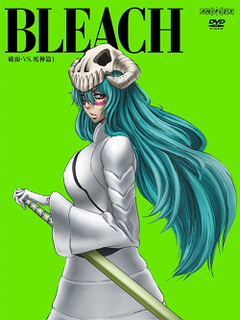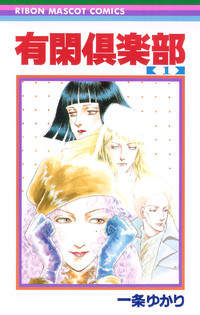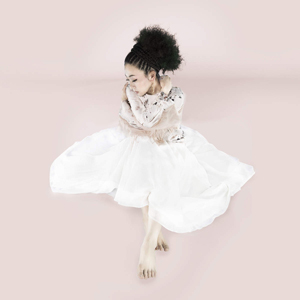Related Research Articles

Bleach is a Japanese manga series written and illustrated by Tite Kubo. Bleach follows the adventures of the hotheaded teenager Ichigo Kurosaki, who inherits his parents' destiny after he obtains the powers of a Soul Reaper—a death personification similar to the Grim Reaper—from another Soul Reaper, Rukia Kuchiki. His new-found powers force him to take on the duties of defending humans from evil spirits and guiding departed souls to the afterlife, and set him on journeys to various ghostly realms of existence.
Kōji Yusa is a Japanese voice actor and narrator, born and raised in Fushimi-ku, Kyoto. He is best known for his roles in Choja Raideen, the Sonic series, Bleach, Battle Vixens, Majin Tantei Nōgami Neuro, Zettai Karen Children and Kamen Rider Den-O. He won the Sinergy Award for Kamen Rider Den-O at the 2nd Seiyu Awards. He married voice actress, Kanako Mitsuhashi in 2007 and he announced on his radio program that they divorced in 2012.
The discography of Ai Otsuka, a Japanese singer-songwriter, contains eight studio albums, two compilation albums, eleven live DVD albums, and twenty-two singles.

Comic High! was a Japanese seinen manga magazine published on a monthly basis by Futabasha. It was launched as a special issue of Weekly Manga Action but became its own independent monthly anthology. The magazine was first published on 2 March 2004 as the industry's first shōjo manga magazine for males; the official website describes the magazine as "Girlish comics for boys and girls." The magazine is aimed at males between 18 and 35 years old. The final issue of the magazine was published in May 2015.

The Soul Society: The Sneak Entry arc is the second season of the Bleach anime series, containing 21 episodes. The episodes are directed by Noriyuki Abe, and produced by TV Tokyo, Dentsu and Studio Pierrot. In the English release by Viz Media, the title is translated as The Entry. The episodes are based on Tite Kubo's Bleach manga series. The episodes' plot centers on Ichigo Kurosaki and his friends' journey to the Soul Society in order to save Soul Reaper Rukia Kuchiki from her impending execution.

Hitohira is a Japanese manga series written and illustrated by Izumi Kirihara. The story revolves around a shy girl named Mugi Asai who is unsure of what club to join in her school, but before she knows it she gets dragged into the Drama Research Society and becomes a member. The manga was first serialized in the Japanese seinen manga magazine Comic High! on March 22, 2004, and is published by Futabasha. The manga has been licensed for distribution in North America by Aurora Publishing; the first and second volumes are due out in October and December 2008 respectively. An anime adaptation, which aired in Japan between March 28, 2007 and June 13, 2007, contains twelve episodes.

Bleach is the generic name for any chemical product which is used industrially and domestically to remove color from a fabric or fiber or to clean or to remove stains in a process called bleaching. It often refers, specifically, to a dilute solution of sodium hypochlorite, also called "liquid bleach".

The seventh season of the Bleach anime series is named the Arrancar: The Hueco Mundo Sneak Entry arc. In the English adaptation of the anime released by Viz Media, the title of the season is translated as The Hueco Mundo. The episodes are directed by Noriyuki Abe, and produced by TV Tokyo, Dentsu and Studio Pierrot. The twenty episodes featured in the season are based on Tite Kubo's Bleach manga series. The season follows Ichigo Kurosaki's journey to Hueco Mundo to rescue Orihime Inoue, who was kidnapped by the arrancar under the command of former Soul Reaper captain Sōsuke Aizen. Although episodes focused on the character Ashido Kanō were not featured in the manga due to timing issues, Kubo still helped the anime staff to show them in the anime.
"Es " is the eighth single released by Mr. Children on May 10, 1995. It debuted at No. 1 on the Japanese Oricon weekly single charts.
"See-Saw Game " is the ninth single released by Mr. Children on August 10, 1995. This music video is the parody of Elvis Costello song "Pump It Up". The single debuted at the number-one position on the Japanese Oricon weekly single charts.

The eighth season of the Bleach anime series is named the Arrancar: The Fierce Fight arc. The episodes are directed by Noriyuki Abe, and produced by TV Tokyo, Dentsu and Studio Pierrot. Based on Tite Kubo's Bleach manga series, the episodes' plot centers on Ichigo Kurosaki's and his friends' battle against the Espada, the strongest members of former Soul Reaper captain Sōsuke Aizen's army, to save Orihime Inoue.

The tenth season of the Bleach anime series, released on DVD as the Arrancar vs. Shinigami arc, is directed by Noriyuki Abe, and produced by TV Tokyo, Dentsu and Studio Pierrot. The 16-episode season is based on Tite Kubo's Bleach manga series. The episodes' plot continues to follow Ichigo Kurosaki's and his friends' battle against the Espada, the strongest of former Soul Reaper Captain Sōsuke Aizen's army, to rescue Orihime Inoue. Episodes 204 and 205 are centered on a soccer match developed by the Kasumiōji Soul Reapers who appeared in season 9.
Stereopony was a Japanese pop rock band that formed in Okinawa, Japan in 2007 and disbanded in 2012. The three-girl band consisted of Aimi Haraguni, Nohana Kitajima, and Shiho Yamanoha (drums). They were signed to the Sony Records music label. The band released 11 singles and three studio albums.

Bleach: Fade to Black is the third animated film adaptation of the anime and manga series Bleach. Directed by Noriyuki Abe, the film was released December 13, 2008 in Japan, later to be released in the US. The film's theme music is "Koyoi, Tsuki ga Miezutomo", performed by Porno Graffitti and its screenplay was written by Natsuko Takahashi and Masahiro Ōkubo. The DVD was released on September 30, 2009 in Japan, with additional footage of Ichigo, Rukia and Kon leaving for the World of the Living. The English dub was released on DVD and Blu-ray on November 15, 2011 in the United States and on May 28, 2012 in the United Kingdom.

Yūkan Club is a Japanese manga written and illustrated by Yukari Ichijo. It is serialized in Shueisha's Bessatsu Margaret. Yūkan Club received the 1986 Kodansha Manga Award for the shōjo category. The manga was adapted into an original video animation by Madhouse Studios. It was also adapted into a Japanese television drama.
The discography of Stereopony, an all female Japanese rock band formed in Okinawa, Japan, consists of 3 studio albums, 1 compilation album, 12 singles, 4 video albums, and 13 music videos. After forming the band in 2007, Stereopony's three members Aimi (vocals/guitar), Nohana (bass), and Shiho (drums) performed on Tokyo FM's School of Lock! program, and were soon signed to Sony Music Japan's gr8! Records record label. The trio released their first single "Hitohira no Hanabira" in 2008, followed by their second single "Namida no Mukō" and third single "I Do It", both released in 2009. "Namida no Mukō" is the band's highest charting single on Japanese Oricon singles chart, peaking at No. 2. Stereopony's first three singles were later featured on the band's debut studio album Hydrangea ga Saiteiru (2009), which peaked at No. 7 on Oricon's albums chart.

"Sakura Hitohira" is a song recorded by Japanese singer Misia, from the album Love Bebop. It was released as the album's second single digitally on February 11, 2015, through Ariola Japan. It was released as a limited double A-side CD single alongside the song "Shiroi Kisetsu" a week later, on February 18, 2015. The song was written by Misia, composed by her0ism and Shirose, from the band White Jam, and arranged and produced by her0ism. It was written specifically for the three-night TX drama The Eternal Zero, adapted from the film by the same name and starring Osamu Mukai, for which it serves as theme song.
References
- ↑ テレビ東京・あにてれ BLEACH (TV Tokyo official site for Bleach) Retrieved November 15, 2008
- ↑ シングル 週間ランキング Retrieved on November 15, 2005
